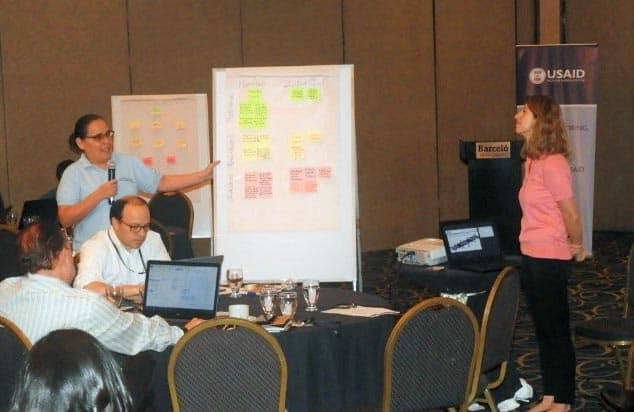
Using Knowledge Management and Learning to Usher in Sustainable Change in El Salvador
Editor’s Note: This post is the second in a two-part series on current ME&A knowledge management and learning (KML) activities. Part 1 provided an overview of how integrating learning into monitoring and evaluation activities (ME&L versus plain M&E) bridges the gap between what monitoring and evaluation reports recommend and actual field practices.
Turning knowledge into action through a greater emphasis on learning, sharing, and adapting to use that knowledge is the impetus for a series of KML training events the USAID/El Salvador Monitoring, Evaluation and Learning Initiative is conducting for USAID implementing partners (IPs) in El Salvador.
So far in 2018, three KML trainings have been delivered to key personnel mainly working in the areas of ME&L and communications for the 30 IPs currently active in El Salvador. The aim of the training series’ framework for collaboration is to address cultural factors and strengthen IP informal networks and support systems to allow performance improvement and optimization as well as sustainability of best practices. The ME&L Initiative team developed the training series, and Ms. Mira Ibrisimovic, an international KML expert with broad experience in USAID-funded activities, led the individual training sessions.
On Feb. 28, 2018, a group of 41 participants from 17 IPs strengthened their capacities on the process of “Theory of Change,” learning to address knowledge gaps while encouraging continuous learning through critical thinking and reflection.
“Expanding knowledge on ‘Theory of Change’ approach has been timely and proper; the process facilitates self-evaluation of guidelines set at the beginning of project implementation that have possibly changed within the national context and which must be considered in view of the expected results,” said Karen Mejía, Gender Specialist from the El Salvador Cacao Alliance, implemented by Catholic Relief Services (CRS).
The second KML training this year, “Information Curation and Dissemination” on March 14, 2018, gathered 40 attendees from 18 IPs. The third training on April 18, “USAID Reporting as Learning Tool,” grouped 42 participants from 17 IPs.
“All these trainings have been fundamental for better addressing our activities by systematically documenting lessons learned. We are aware that knowledge is our most important asset…if we do not constantly adapt we do not learn from what we do and then knowledge is deemed useless,” said Ana Gabriela Quiros, from the Crime and Violence Prevention project, implemented by Creative Associates.
USAID/El Salvador awarded ME&A the USAID/El Salvador Monitoring, Evaluation and Learning Initiative as a task order in 2016 under the USAID Policy, Planning and Learning-Learning, Evaluation and Research (PPL-LER) Indefinite Delivery Indefinite Quantity Contract to provide evaluation, monitoring and assessment services for USAID Missions and Offices worldwide.


